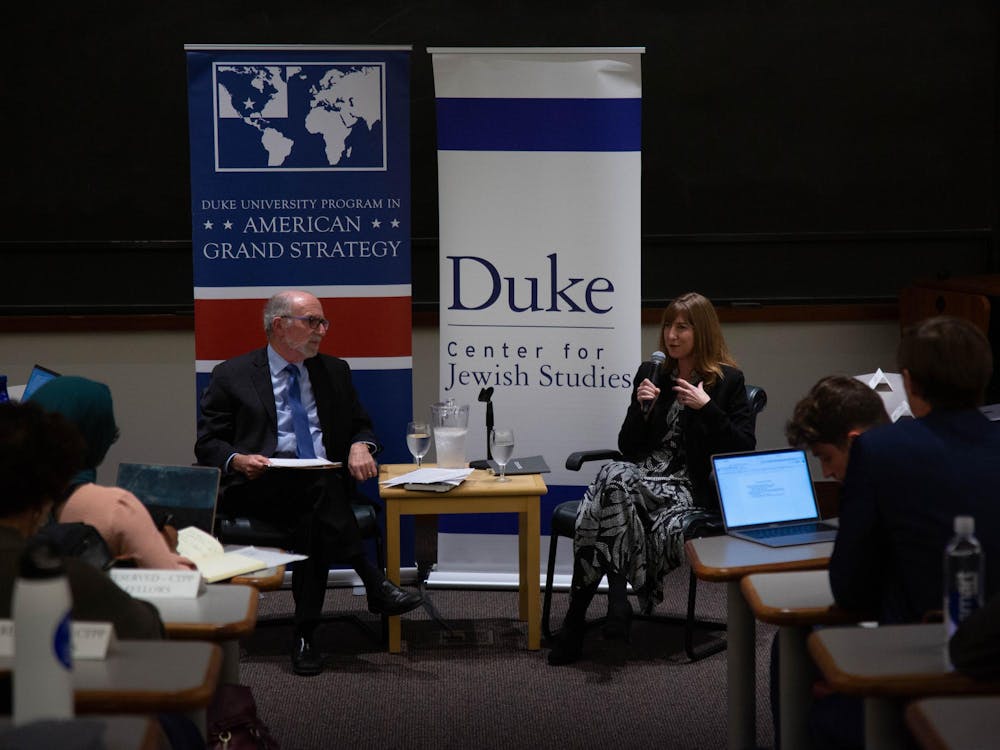Dahlia Scheindlin, author of “The Crooked Timber of Democracy in Israel: Promise Unfulfilled,” spoke at a Wednesday event hosted by the Duke Program in American Grand Strategy and the Duke Center for Jewish Studies.
Bruce Jentleson, William Preston Few professor of public policy and professor of political science, spoke with Scheindlin about the Israel-Hamas war, as well as the broader history of the Israel-Palestinian conflict.
Jentleson began the event with a statement about the sensitivity of these topics, which Scheindlin echoed.
“It's a very difficult time to be able to speak analytically and keep it together. The events in the region are so vicious and violent that I think we're all trying to get our footing,” she said.
Why the Israel-Hamas war started
Scheindlin believes that the Israel-Hamas war’s beginnings on Oct. 7 can be attributed to the bigger picture of the Israel-Palestinian conflict.
“Why did this break out now? Because no conflict is ever frozen,” she said. “A conflict is either resolved or it continues.”
Scheindlin said that some people thought the conflict seemed manageable before the Israel-Hamas war. Now she says “the people who advocated strategies of conflict management or shrinking the conflict have a lot to answer for because conflicts will always eventually have cycles of escalation of violence.”
As to why the war started at the time it did, Scheindlin delved into an analysis of Hamas and their internal dynamics. She referred back to the indefinite postponement of the Palestinian elections in April 2021, when it became clear to Hamas that there was “no real route towards an actual competition that might result in Hamas becoming a true leader of Palestinians.”
Scheindlin also spoke about recent widespread protests against the Israeli government’s proposed judicial reforms. In the wake of these protests, many active members and reservists of the Israel Defense Forces threatened to stop serving or reporting for duty, which Scheindlin described as “weakening the army precisely at a time” when the conflict began to escalate.
“A very severe blockade on Gaza and the resulting pressures combined with this policy of keeping Hamas just at the right level, according to the analysis plan, and then the social and democratic crisis in Israel which lowered the defenses and lowered the attention to other governing priorities … led to the decision to attack roughly at this time,” she said.
Other potential causes, according to Scheindlin, include the symbolism of conducting an attack close to the 50th anniversary of the Yom Kippur War and the geopolitical motivation of Hamas to disrupt Israel’s normalization of relations with other Arab countries.
Ethical dimensions
Responding to a question about the ethical dimension of the war, Scheindlin stressed the need for rules that “limit the damage of war” to be “applied universally.” She then described the “international rules-based order” based on universal values of human rights.
“Have this basis to try to guide us for the rules of war,” she said. “It either applies to nobody or it applies to everybody.”
She also noted the need for people to “verify all the information” they see about the war and to not automatically assume all information they initially see is true.
“The principle is to verify everything to the best extent possible before making a decision,” Scheindlin said.
Scheindlin continued to emphasize the importance of human rights. Scheindlin acknowledged the difficulty of balancing this amidst chaos, referring to when she was forced to run to shelter in Tel Aviv during Hamas rocket attacks following Oct. 7.
Possible consequences of the war
Scheindlin spoke about an anticipated ground attack launched by Israel, which has been delayed for several reasons. According to Scheindlin, these may include American involvement and the hostages and related negotiations, all while the world is “bracing for a longer war.”
The long-term consequences are hard to tell, according to Scheindlin.
“The only scenarios people can imagine in Israel at the upper levels, or at least in their public conversations, are somehow that Israel re-occupies Gaza or that it gets turned over to the Palestinian [National] Authority control,” she said. Scheindlin added that she did not believe that either solution was viable.
Scheindlin, however, is “starting to think” that there may be another alternative, including getting “international actors involved.”
“These could be Arab countries who get involved with peacekeeping forces, which by all accounts they don't want to do, and I can understand why. This can be Western countries trying to get involved and help support peacekeeping forces or help provide the basis for building institutions,” she said. “Whether it be some combination of Western countries and Middle Eastern countries, or countries in the region that are very influential … taking some role.
Get The Chronicle straight to your inbox
Signup for our weekly newsletter. Cancel at any time.

Michelle Brown is a Trinity junior and an editor-at-large of The Chronicle's 120th volume.

